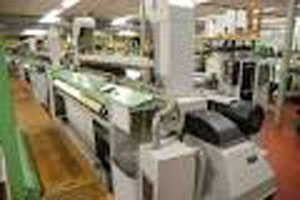

The textile machine manufacturing players who earlier witnessed order booking in double digit on a daily basis, in last few quarters have seen it go down to weekly and fortnightly. Along with revenues, the profit margins too have thinned down to single digits. This has led to trimming down the staff.
The Registered textile machinery-manufacturing units the twin townships are 15 and as per the industry association, the number is around 25. These manufacturers are largely into producing weaving and spinning machines, fabric-knitting machine, Jacquard machine (power and handloom), machinery spare parts, crochet machines, tufting and carpet machines, according to UP State Industrial Development Corporation or UPSIDC.
Business model of the cluster is entirely B2B as they supply machinery items only to small and medium textile manufacturers and garment dealers and exporters. According to Shyam Sunder, Owner of SS Engineering who are in business for nearly two decades have realised that demand for home and garment textiles is evergreen. This primary factor has been the backbone for the emergence of domestic textile machinery industry in the twin townships.
But, Shyam Sunder also emphasized on the dismal market scenario saying that last three to four years have been disappointing with garment and readymade export business witnessing slump. The growth is directly connected to them and so orders have been contracting every quarter and subsequently the business volume has come down by 50 to 60 percent.
The machine manufacturer has two units in Noida with a production capacity of nearly 80 machines per month. They are primarily manufacturing cloth-finishing machines, fabric-knitting machinery, and spare parts. Major markets or them include NCR, Punjab, Chennai, Selum.
While, Naresh Gupta owner of BK Hi Tech Engineering in Noida is of the opinion that although this industry has good future but operational costs are a concern. Absence of adequate skilled engineering labour is key issue. Noida has textile-manufacturing labour but when it comes to operating machines, they need to hire from other cities or need to train the workers themselves.
They have recently gone for mechanization process by procuring few computerised machines that will replace labour dependency. It’s an expensive proposition but will benefit in medium term.
Their manufacturing capacity is over 150 weaving & spinning machines and power jacquard machines for designing cloth. Shri Jai Textiles Machinery and Surjit Textiles, based in Greater Noida are one of the few into laundry equipment, finishing and garment equipment. For them more than labour, the abysmal state of land allotments, power and fluctuating production cost weighs heavier.
Mukesh Singh, owner of Shri Jai Textiles and Joint-Secretary of Greater Noida Entrepreneurs Association pointed out that there is an indifferent attitude shown by the Greater Noida Authority which is causing a big roadblock for the business expansion in the region. As the authority on one hand has been promoting schemes for small and medium businesses through land allotment but at the same time has given the land to developers for residential and commercial projects. This indifferent attitude has been a big roadblock for business expansion in the region, points out
Power woes are not new and the manufacturers have been managing it with diesel gensets that are turning out to be expensive. Their production capacities have gone down by at least 20 per cent.
Shri Jai Textiles has its major business in north India, with stepping into exports in the last decade catering to subcontinent, Middle-East and Europe markets.
Surjit of Surjit Textiles on the other hand are worried about the absence of organised raw material market in the region that leads to avoidable expenses and price fluctuations. Iron, steel and aluminum are basic raw materials for the business and in the absence of raw material market here, procurement has to be done from neighbouring states that includes of unnecessary paperwork, transportation cost and additional taxes. Moreover, these materials are prone to frequent price fluctuations and so the average production cost deviation is 12 to 15 per cent.
Loftex USA is strengthening sustainability with the launch of eco-friendly towel sets, blending innovative performance features with luxurious designs.
Toray Industries, Inc. announced that starting this April, it will implement the mass balance approach in manufacturing its TORAYLON™ acrylic…
Cxffeeblack has joined forces with COMOCO Cotton, a sustainable textile company, to create a special coffee-dyed T-shirt made from unbleached…
Nikwax has unveiled its latest innovation, the Direct.Dry Down line, setting a new benchmark in waterproof down with great performance…
Wrangler x Accelerating Circularity jeans are proving that post-consumer and post-industrial cotton can be effectively reused in everyday clothing.
Swiss cleantech innovator Bcomp has partnered with Japanese composite specialist Tras to bring natural fibre solutions to the world of…